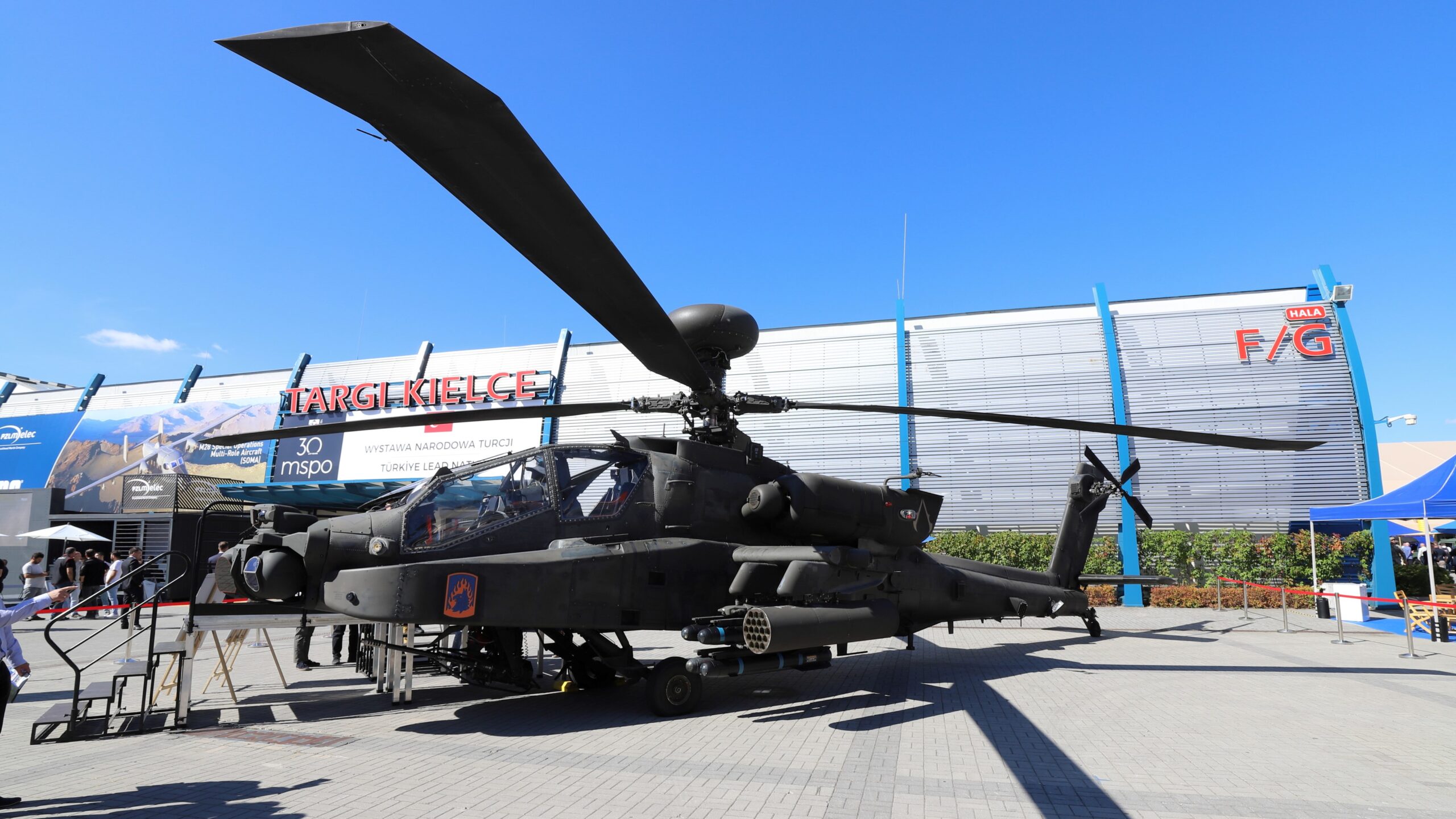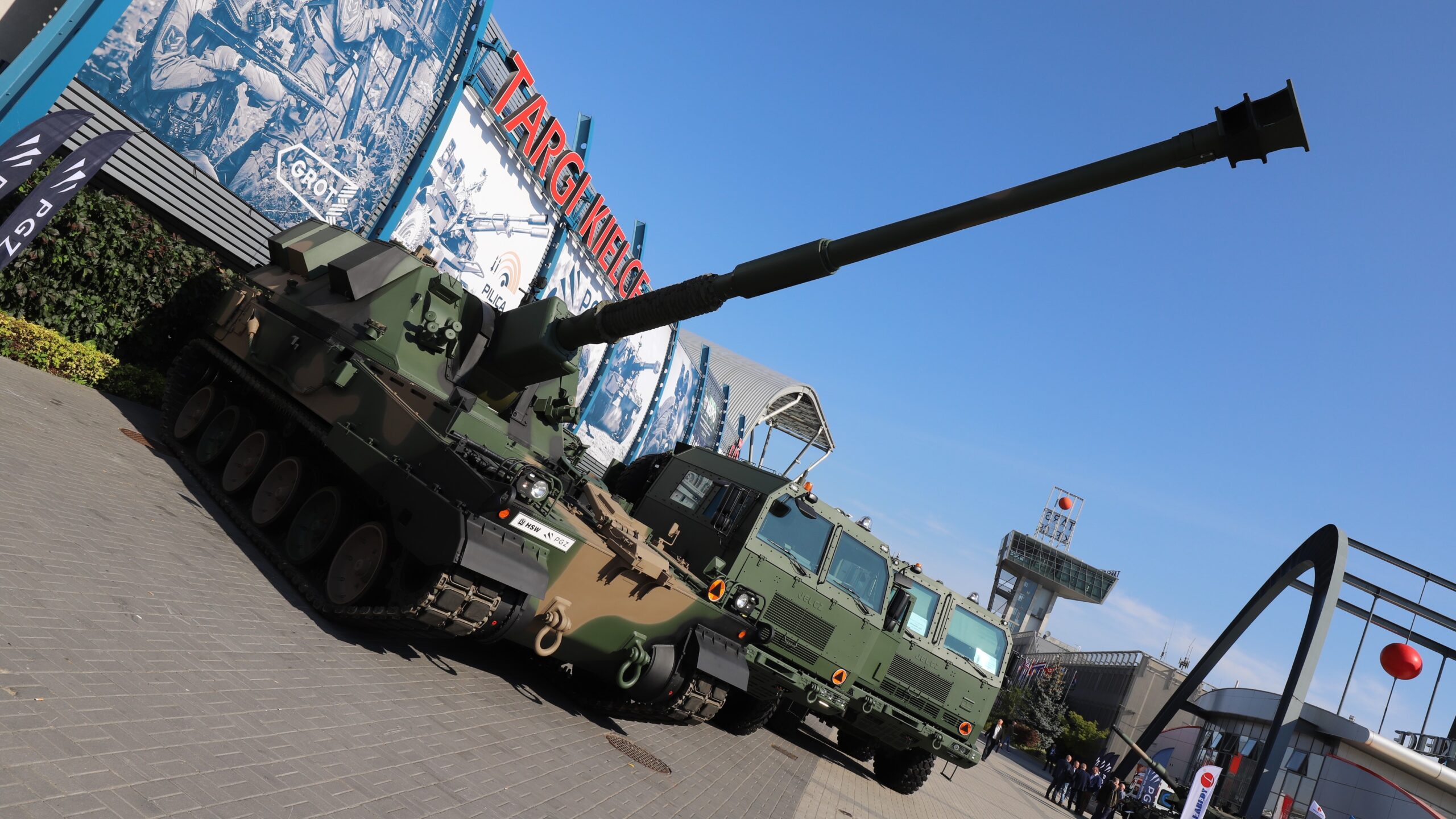
An Apache helicopter on display during the 2022 MSPO show in Poland. (Bartosz Glowacki/Staff)
KIELCE, Poland — Today’s surprise announcement that Poland would purchase 96 AH-64E Apache helicopters headlined the 30th annual International Defense Industry Exhibition (MSPO) here, but it was far from the only deal announced during the conference.
All told, Warsaw — already in the midst of a massive military modernization push — dropped $1.4 billion in contract announcements, even without a final, likely hefty price available on the Apache deal.
This week’s announcements continue a major spending splurge from Warsaw, in the wake of Russia’s invasion of Ukraine. In late July, Poland inked a trio of agreements with South Korea that add up to a roughly $14.5 billion investment in new capabilities, covering the purchase of 1,000 K2 tanks, 672 K9 self-propelled howitzers, and 48 FA-50 light combat aircraft. And in May, Poland moved forward with investing in both new HIMARS and Patriot capabilities.
The Apache deal served as the biggest surprise. When Poland’s Prime Minister Mateusz Morawiecki paid an unexpected visit at Kielce on the third day of MSPO, media began speculating that he would announce the purchase of new attack helicopter under the Kruk program — an effort that had been expected to cover 32 rotorcraft. Instead, the news came from Poland’s Deputy Prime Minister and Minister of National Defense Mariusz Błaszczak, who was in Germany to meet with the Ukraine Contact Group led by US Secretary of Defense Lloyd Austin.
Dziś podczas #MSPO2022 wicepremier @mblaszczak podpisał umowy o wartości ok. 3 mld zł. na kolejne dostawy sprzętu i uzbrojenia dla #WojskoPolskie 🇵🇱. #modernizacja @PGZ_pl
–
📄 https://t.co/XqJ1qSjkg4
📸 https://t.co/OhDJCL9oYq pic.twitter.com/3VuP617iEM— Ministerstwo Obrony Narodowej 🇵🇱 (@MON_GOV_PL) September 6, 2022
At 9:35 AM eastern time, Błaszczak tweeted out the announcement that Boeing had won the Kruk effort, and that instead of 32 helicopters for two squadrons as expected, Poland was interested in 96 helicopters — six squadrons worth. Although no dollar total has been announced, expect it to be expensive. As a rough comparison, Australia’s plans to buy 29 AH-64E helicopters, announced in May, came with a $3.8 billion price tag.
While Boeing knew it was in the competition, if executives knew they were going to win, it wasn’t clear during the show itself. Adam Hodges, Capture Team Lead for Vertical Lift International Sales at Boeing Defense, Space & Security, told reporters on Tuesday that the company was offering Poland “AH-64EV6, with MUM-T capability, but the level of interoperability will be detailed on base of government to government talks, and will depend on customer requirements and US Government.” Hodges added Boeing is in talks with number of Polish companies about doing local sustainment.
According to Boeing’s press release after Błaszczak’s announcement, “an Apache selection strengthens U.S-Polish military ties by enhancing interoperability and cooperation between Poland, the U.S. Army and NATO nations. During the procurement process, Boeing established significant cooperative partnerships across Polish government and industry. Our partnership with the Polish Armaments Group in particular will continue to expand as we implement training and sustainment efforts with local industry.”
It is believed all of Poland’s Apaches will be newly manufactured, because as Hodges stated “there is no Apache [in the boneyard], and in Mesa we produce 80-100 aircraft per year.” He added that the “only potential problem could be only global supply chain” moving forward.
What else happened at MSPO?
Howitzers, Trucks And Other New Equipment
As part of Monday’s show opening, Błaszczak approved a contract for the supply of 155 mm self-propelled AHS Krab howitzers, produced domestically by Huta Stalowa Wola with vehicles for the Regina fire module at the company level. The agreement between Poland’s MND Armaments Agency and Huta Stalowa Wola was approved in the presence of President Andrzej Duda, the Commander-in-Chief of the Polish Armed Forces.
“I have approved another contract, which is an order for 48 Krab howitzers and 36 vehicles. The contract value exceeds PLN 3.8 billion ($800 million),” said Błaszczak. The original contract for Poland’s first tranche of Krabs was in 2016.
As he noted “the potential of Poland, the potential of Huta Stalowa Wola is used to the maximum and is increasing and is being expanded, as exemplified by this contract or the contract signed between HSW and PGZ with Ukraine for the supply of Krab howitzers.

Poland will be purchasing more of its domestically-produced Krab Howitzers. (Bartosz Glowacki/Staff)
“I always emphasize that whenever we can, we order military equipment in the Polish defense industry, like Krab howitzers, that proved themselves during the war and they are an important weapon in the hands of the Ukrainians, an effective weapon in the defense of Ukraine”, Błaszczak stated.
Next day, on Tuesday, September 6th, Błaszczak signed further contracts for acquiring of equipment and weapons for the Polish Army, worth approximately PLN 3 billion ($630 million). That package includes new Rosomak AWR (artillery reconnaissance vehicles) for the Rak fire modules at the company level; AŁC-T digital communication and transmission shelter; command and control cabins for the Wisła (Patriot) system – phase 1; JELCZ 442.2 and 662.D43 trucks; individual optoelectronic equipment; and implementation of development work for the Gladius-2 unmanned search and attack vehicle.
“We follow the principle that we order weapons made by the Polish defense industry. We invest in the Polish defense industry, create production opportunities and increase production potential,” Błaszczak said during the announcement. “We are deeply convinced that with the strength of the Polish defense industry we can ensure a strong position of our armed forces.
“Not all types of weapons are produced in the Polish defense industry, therefore we are looking for cooperation with other partners. Whenever we establish such cooperation, we talk about the intellectual potential of the Polish defense industry. We offer to use this potential in a situation where the benefits are mutual. Such a fundamental benefit is the fact that the Polish Army is armed with modern weapons. The immediate advantage is that Poland is safe. I want to assure you that we will continue these efforts”, Błaszczak stressed.
Air Force picks Anduril, General Atomics for next round of CCA work
The two vendors emerged successful from an original pool of five and are expected to carry their drone designs through a prototyping phase that will build and test aircraft.


























